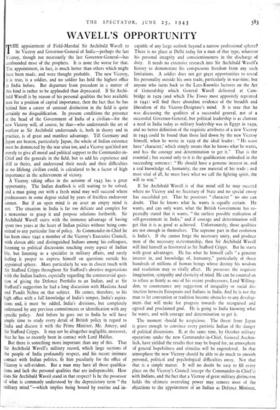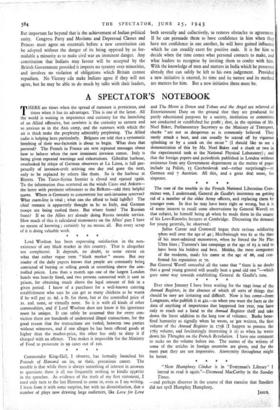WAVELL'S OPPORTUNITY
THE appointment of Field-Marshal Sir Archibald Wavell to be Viceroy and Governor-General of India—perhaps the last Viceroy, though not necessarily the last Governor-General—has confounded most of the prophets. It is none the worse for that. The appointment, in fact, is much better than others which might have been made, and were thought probable. The new Viceroy, it is true, is a soldier, and no soldier has held the highest office ,n India before. But departure from precedent in a matter of this kind is rather to be applauded than deprecated. If Sir Archi- bald Wavell is by reason of his personal qualities the best available man for a position of capital importance, then the fact that he has behind him a career of unusual distinction in the field is quite .ertainly no disqualification. In present conditions the presence at the head of the Government of India of a civilian—for the new Viceroy will, of course, be that—who understands the art of warfare as Sir Archibald understands it, both in theory and in practice, is of great and manifest advantage. Till Germany and Japan are beaten, particularly Japan, the whole of Indian existence must be dominated by the war situation, and a Viceroy qualified not merely to give all moral and political support to the Commander-in- Chief and the generals in the field, but to add his experience and skill to theirs, and understand their needs and their difficulties as no lifelong civilian could, is calculated to be a factor of high importance in the achievement of victory.
A Viceroy, taking office in the autumn of 1943 has a great opportunity. The Indian deadlock is still waiting to be solved, and a man going out with a fresh mind may well succeed where predecessors in some degree staled by years of fruitless endeavour cannot. But .if an open mind is an asset an empty mind is not. The situation in India is far too delicate and complex for a newcomer to grasp it and propose solutions forthwith. Sir Archibald Wavell starts with the immense advantage of having spent two years at the heart of Indian politics without being com- mitted to any particular line of policy. As Commander-in-Chief he has been since 1941 a member of the Viceroy's Executive Council, with eleven able and distinguished Indians among' his colleagues, listening to political discussions touching every aspect of Indian life, but listening as a specialist in military affairs, and rarely feeling it proper to express himself on questions outside his appointed sphere. More particularly he was in closest touch with Sir Stafford Cripps throughout Sir Stafford's abortive negotiations with the Indian leaders, especially regarding the controversial ques- tion of giving the Defence Portfolio to an Indian, and at Sir Stafford's suggestion he had a long discussion with Maulana Azad and Pandit Nehru on that subject. He comes, therefore, to his high office with a full knowledge of India's temper, India's aspira- tions and, it must be added, India's divisions, but completely unfettered by any previous commitments or identification with any specific 'policy. And before he goes out to India he will have ample time to study every detail of British policy in regard to India and discuss it with the Prime Minister, Mr. Amery, and Sir Stafford Cripps. It may not be altogether negligible, moreover, that he has so recently been in contact with Lord Halifax.
But there is something more important than any of this. That Sir Archibald Wavell's military record, which large sections of the people of India profoundly respect, and his recent intimate contact with Indian politics, fit him peculiarly for the office of Viceroy is self-evident. But a man may have all those qualifica- tions and lack the personal qualities that are indispensable. How does Sir Archibald Waveil stand in that respect? Is he the possessor of what is commonly understood by the depreciatory term " the military mind "—which implies being bound by routine and in- capable of any large outlook beyond a narrow professional sphere? There is no place at Delhi today for a man of that type, whatever his personal integrity and conscientiousness in the discharge of duty. It needs no extensive research into Sir Archibald Wavell's history to demonstrate his conspicuous freedom from any such limitations. A soldier does not get great opportunities to reveal his personality outside his own trade, particularly in war-time, but anyone who turns back to the Lees-Knowles lectures on the Art of Generalship which General Wavell delivered at Cam- bridge in 1929 (and which The Times most appositely reprinted in 1941) will find there abundant evidence of the breadth and liberalism of the Viceroy-Designate's mind. It is true that he was discussing the qualities of a successful general, not of a successful Governor-General, but political leadership is as clamant a need in India today as military leadership was in Egypt in 1939, and no better definition of the requisite attributes of a new Viceroy in 1943 could be found than those laid down by the new Viceroy himself, when he wrote in 1929 of the ideal leader: " He twist have ' character,' which simply means that he knows what he wants, and has the courage and determination to get it." That is the essential ; but second only to it is the qualification embodied in the succeeding sentence: " He should have a genuine interest in, and a real knowledge of, humanity, the raw material of his trade ; and most vital of all, he must have what we call the fighting spirit, the will to win."
If Sir Archibald Wavell is of that mind still he may succeed where no Viceroy and no Secretary of State and no special envoy has succeeded yet. That he possesses " character " no one can doubt. That he knows what he wants is equally certain. He wants, and can only want, what the British Government has re- peatedly stated that it wants, " the earliest possible realisation of self-government in India," and if courage and determination will get that it is as good as achieved. Unfortunately, those qualities are not enough in themselves. The supreme part in that evolution is India's. If she cannot forge the necessary unity, and produce men of the necessary statesmanship, then Sir Archibald Wavell will find himself as frustrated as Sir Stafford Cripps. But he starts with great advantages. He has what he himself calls " a genuine interest in, and knowledge of, humanity," particularly of those hundreds of millions of human beings whose destiny his wisdom and resolution may so vitally affect. He possesses the requisite imagination, sympathy and elasticity of mind. He can be counted on to refuse as firmly as one of his recent predecessors, Lord Willing- don, to countenance any suggestion of inequality or social dis- tinction between Europeans and Indians in India. And he is not the man to let convention or tradition become obstacles to any develop- ment. that will make for progress towards the recognised and agreed and proclaimed goal. He is going to India knowing what he wants, and with courage and determination to get it.
The moment should be auspicious. The threat from Japan is grave enough to convince every patriotic Indian of the danger of political dissensions. If, at the same time, by October military operations under the new Commander-in-Chief, General Auchin- leck, have yielded the results that may be hoped for, an atmosphere of general hopefulness and stimulus will be engendered. In that atmosphere the new Viceroy should be able to do much to smooth personal, political and psychological difficulties away. Not that that is a simple matter. It will no doubt be easy to fill every place on the Viceroy's Council (except the Commander-in-Chief's) • with Indians, and the fact that a Viceroy of great military distinction holds the ultimate overruling power may remove most of the objections to the appointment of an Indian as Defence Minister. But important far beyond that is the achievement of Indian political unity. Congress Party and Moslems and Depressed Classes and Princes must agree. on essentials before a new constitution can be adopted without the danger of its being opposed by so for- midable a minority as to make civil war an imminent danger. Any constitution that Indians may favour will be accepted by the British Government provided it imports no tyranny over minorities, and involves no violation of obligations which Britain cannot. repudiate. No Viceroy can make Indians agree if they will not agree, but he may be able to do much by talks with their leaders, both severally and collectively, to remove obstacles to agreement. If he can persuade them to have confidence in him when they have not confidence in one another, he will have gained influence which he can steadily exert for positive ends. It is for him to decide when the time comes what personal contacts to make, and what leaders to recognise by inviting them to confer with him. With the knowledge of men and matters in India which he possesses already that can safely be left to his own judgement. Provided a new initiative is exerted, its time and its nature and its method are matters for him. But a new initiative there. must be.































 Previous page
Previous page